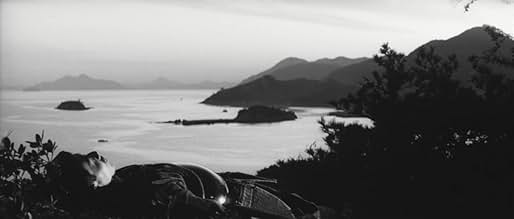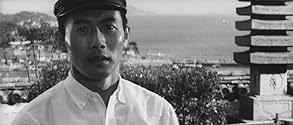Kokubu Jiro, stoic Kendo captain, perplexes teammates like arrogant Kagawa who struggles to understand his reserved demeanor.Kokubu Jiro, stoic Kendo captain, perplexes teammates like arrogant Kagawa who struggles to understand his reserved demeanor.Kokubu Jiro, stoic Kendo captain, perplexes teammates like arrogant Kagawa who struggles to understand his reserved demeanor.
- Director
- Writers
- Stars
- Director
- Writers
- All cast & crew
- Production, box office & more at IMDbPro
Featured reviews
Kagawa is the antagonist, the kendo fighter with great technique but whose swordfighting is sometimes moved by arrogance, yet Misumi doesn't set him up as the bad guy. He wants to understand how Kokubu can live the way he does and he can't so it's frustrating for him. The problem with the movie is that it's based on the writings of Yukio Mishima. His ascetic ideas are dishonest. Kokubu speaks of simplicity and 'satisfaction of the present', and the movie wants us to believe he's the only one to know true freedom from societal constraints. He has no fear but he wants to win the championship, so he still has hope to cling to. On the gravestone of Nikos Kazantzakis, a more earthy man and philosopher than militant Mishima could ever hope or want to be, it reads "I fear nothing, I hope for nothing, I am a free man".
In the end everyone laments "why couldn't we understand Kokubu?". Kokubu has lifted himself a little above and beyond mundane life and earthly desires, like a saint or a hermit perched on a rock above a high cliff, but he's alone there at the last, and his cry in the wilderness should have been painful and anguished. The movie doesn't give us the cry or even the faint echo of it. In its way, Ken holds him up as a hero to be wept for and a model for inspiration, it refuses to see the folly in his life. But to be Kokubu one must cut himself from everything that makes us human, all the vice and folly which we know we must escape yet realize at every turn that we cannot and live to regret it, and it's that fallibility that makes us human and makes the human experience what it is. In the Kazantzakis book Zorba the Greek the ascetic cellibate loner protagonist realizes his world of writings amounts to nothing and eventually looks up to his wild companion who is filled with an immediate joy for life with envy and admiration. Maybe that is the difference between Greeks and Japanese, maybe simply the difference between Kazantzakis and Mishima.
In that aspect Ken is a smoke mirror. It distorts the image, it twists personal ideology out of real life. But like all mirrors it still reflects something held up against it and there's value in that. If we can't know something of our life in Ken, at least we can know something about the life and philosophy of Yukio Mishima.
Unheralded titan Kenji Misumi frames and shoots it like he's already a world class director. There's a lot of Japaneseness in it though so, like most of his work, like most of 60's Japanese cinema in general, it will remain the temple of worship of a niche audience. And unlike the more difficult works of people like Toshio Matsumoto or Yoshishige Yoshida it doesn't require blood and human sacrifice from us. Like Kokubu, this is cinema strong and calm and resolute, assured and precise, like something chiseled on black obsidian, the details crisp and vivid.
Kokubun represents Japans innocence, its virtue, its purity, its purpose (his name means "a part of the country). He is unknowingly engaged in a battle to be the leader of the kendo club with an equally talented rival, Kazawa, who lacks Kokubu's focus and self possession.
Kendo is the epitome of the traditional Japanese spirit; pay attention to how Western "things" are presented and juxtaposed to traditional values (I'm thinking of a gun, a café, and a dance scene) and compare how the characters are different in the city versus at the temple.
It's a subtle story. Kazawa is unable to discipline himself and Kokubun is unwilling to bend himself to the future or the "ways of the world". How will it play out? Watch it and see: it's a fine film where kendo is a metaphor and the story is chance to think on something more.
Did you know
- Quotes
Mibu: We come to life, we die... It's a perpetual renewal. How boring
Jiro Kokubun: Did you come up with that? Or did you read it in a book
Mibu: No, I just came up with it.
Jiro Kokubun: Don't think about the future, you are still young.
Mibu: But I have hope
Jiro Kokubun: Me too, but I dislike triviality.
Mibu: Triviality? Is thinking about the future trivial?
Jiro Kokubun: Yes.
Mibu: So what is your goal in life then?
Jiro Kokubun: Satisfaction of the present. The sword, and nothing else. I only think about victory at the national championship. Everything else is futile. Do you understand?
Mibu: Yes, i'm trying. I won't think about the future anymore.
Mibu: Captain... I want to become strong like you.
Jiro Kokubun: You need to practice a lot for that. It's the only way.
Details
- Runtime1 hour 34 minutes
- Color
- Aspect ratio
- 2.35 : 1
Contribute to this page


























